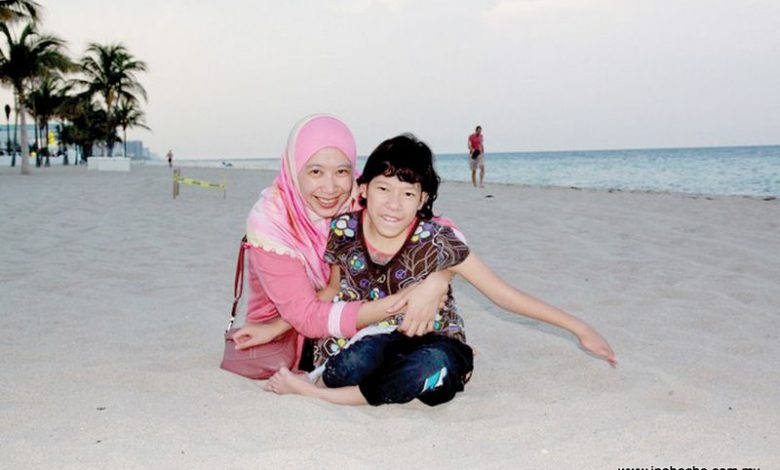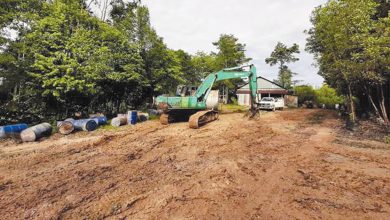Compassion for a Special-Needs Mother


By Mariam Mokhtar
Malaysians were shocked to read about 15-year-old Muhammad Firdaus Dullah, who has cerebral palsy (CP). Immigration officers stumbled upon him during a raid to weed out illegal migrant workers. Firdaus was filthy and malnourished. Whilst his mother goes to work, Firdaus stays in a storeroom from early morning to late at night.
How do the parents of other special-needs children cope? Ipoh Echo speaks to Zahriah Mohd Faiz, who is the mother of 15-year-old Balqis. Balqis has CP.
1. As a mother of a special-needs child, what are your thoughts about the teenager who was found in Nilai?
It was devastating to read that he was found in that condition. Unless we really know what happened we should reserve our judgement of the mother.
2. Bringing up a child, is hard enough for most parents. Bringing up a special-needs child is more demanding. Do you empathise with the teenage boy’s mother?
Raising a child with CP is emotionally and physically draining. Firdaus’ mother will have financial traumas, face a test of her faith and must go through the experience alone, without a husband for support and strength.
My daughter, Balqis is the same age as Firdaus. Reading about him made me recall the hardship of being a new mother and raising a special-needs child.
The first time I heard the term ‘Cerebral Palsy’ was when Balqis was diagnosed with it. It took me two years to understand what went wrong, accept the situation and deal with it.
3. Firdaus’ mother denies neglecting him and yet he is skin and bones. He lives alone in a store room covered in filth. Can you understand why she should think this?
There were “Before” and “After” photos of Firdaus, taken 6 months ago. My personal view is that we should remind ourselves that she has taken good care of Firdaus for the past 14½ years. Something must have happened to her during the past 6 months. We must investigate, understand and provide support for the mother, her son Firdaus, as well as all parents and children with special-needs.
4. What is your advice to other parents of special-needs children?
Patience and prayer help to soothe the hurt, the frustrations and loneliness. It is not easy having to care for special-needs children. We lack sleep. The child has tantrums. We get tired. Others give us “looks”. We lack financial support, to buy the various aids and equipment needed to help the child.
My most important advice to Muslim parents is from this verse: “O you who have believed, seek help through patience and prayer. Indeed, Allah is with the patient.” (2:153)
Life is too short to worry too much. We should go out and enjoy life, as much as possible. It may not be like other ‘normal’ families, but it is refreshing and good to recharge ourselves.
Life isn’t over just because one has a special-needs child. Couples with a special-needs child must support one another because and the rest of the world will not.
Try to contact parents in a similar situation, and share the happiness and sadness. Only those parents with special-needs will understand.
5. The Minister for Women, Family and Community Development, claims that the mother should have sought help. In your experience, how easy is it to get this help?
My daughter was two, when she was diagnosed with CP, and we had no idea where to seek help. None of the medical officers in the private or government hospitals were of any use. We were left in the dark and had no idea where to seek information.
A chance meeting with my husband’s old friend was critical. He suggested contacting the NURY Institute of Family and Child Development for help. NURY is a private foundation, and is not cheap, but they told us about diet and therapies for Balqis.
The help that the minister mentioned is not easy to obtain. It was only after we returned from England, where my husband was doing his PhD, that we learnt that we had to register Balqis with the welfare department and obtain an OKU (person with disabilities) card.
My husband had to meet several officers and go to several places, to sort this out. I can imagine how difficult it would be for less financially fortunate parents, who do not have the means to travel from one place to another, or the working person who does not get support from their employer.
In Firdaus’ case, the mother is a single, working mother. It is even harder for her. We had no idea how to get help and I imagine Firdaus’ mother would have faced the same problems as us.
Parents should be given the information and guidance; they should not have to press for answers.
6. One report said that special-needs schools are available. Do you agree?
In my experience, special-needs schools in Malaysia are very limited in number and offer limited services. They are in towns, thus making them out-of-reach for many.
They only cater for children with certain disabilities. There is no special-needs school that caters for children who can’t walk and who are very dependent. Very few parents can afford to accompany the child or send a maid with him.
The teachers and the schools are not fully equipped to handle children with poor mobility. The schools do not have enough qualified staff, to help the teachers.
The parents who must work to support the family, and single parents who struggle to survive, do not have the time to attend school with their child. Parents who live far from the special-needs school, especially those with no car, would find it almost impossible to send the child to school.
7. Have you any suggestions for choosing a special-needs school?
An integrated special-needs school is one which is equipped with special-needs apparatus, facilities, teachers and therapists to provide an education for the special-needs children. Special-needs children need social interaction (in their very unique way), stimulation and a sense of belonging to society.
Field trips to public places help the community see and realise that this group of disabled children is part of society and helps the children to see the outside world. A special-needs school helps educate the children just as a normal child in a normal school.
If Malaysia is serious about providing special-needs children with an education, to which they are entitled, it is best to learn from countries like England or Australia.
8. Do you think Firdaus’ case is an isolated one?
Yes I have met a few. I believe there are many more like him, in Malaysia. They have no father figure, no extended families to help. No one to turn to for support or financial help.
9. One report claimed that parents refused to get help from the government. Why, in your opinion, would parents refuse help?
I can’t possibly think of a reason why the parents would refuse help from the government, unless it was a ‘struggle’ to get that help in the first place. I think parents may be put off by the procedures, the bureaucracy, the time needed and the energy and money needed to get that help in the first place.
Based on our experience, the amount of financial aid given does not cover the cost of diapers, milk, medication or additional treatments. Parents are vetted and need to go on a course, before they are considered eligible. The procedure to seek aid is not made easy.
10. In your case, you have had education and the means to look after Balqis. What is your advice for someone who is less financially able?
Seek help from your immediate family and friends, who in turn can offer help in caring for the child for an hour or two, so that the parents/parent can recharge themselves. The extended family can contribute small sums, regularly.
Second, the zakat (Muslim charity) system must be upgraded to involve special-needs children. The welfare department (JKM) needs to take note of the real problems faced by special-needs parents, reach out to them and make the procedures easier. JKM services need to be accessible by all levels of the community. Most important is to have faith in God.
11. Has our society contributed to this teenage boy’s isolation and neglect?
Yes, definitely. Society plays an important role. Society must be more caring and understand the needs of the families with special-needs. They should stop being discriminatory and stop staring at the children, when they go out.
One person was staring so intently at Balqis that she walked into a wall. Society can help by making special-needs children feel part of the community and important members of society.
Ipoh Echo would like to thank Zahriah for sharing her thoughts with us.


